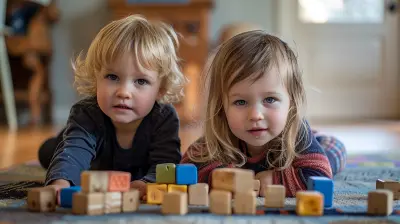Storytime with a Purpose: Books That Encourage Empathy
11 October 2025
Parenting is a wild ride, isn’t it? One minute, you're cleaning crayon off the walls, and the next, your little one is asking deep, soul-searching questions like, “Why is that kid crying?” or “Why do we have to share?” (Cue the dramatic sighs).
As much as we love their curious little minds, teaching empathy can sometimes feel like explaining quantum physics—complicated, messy, and often leaving you questioning your own understanding. But luckily, we have a secret weapon: books!
Reading stories that focus on emotions, kindness, and understanding can do wonders for molding tiny humans into compassionate, caring individuals. So, grab your comfiest blanket, scoop up your kiddo, and let’s dive into some of the best books that encourage empathy (without making you sound like a preachy robot). 
Why Is Teaching Empathy Important?
Before we get to the book list, let's chat about why empathy matters. In a world where people sometimes seem more connected to their screens than to each other, raising kind and understanding kids is like equipping them with superpowers.Empathy helps kids:
- Build strong friendships (because no one likes a selfish playdate buddy).
- Navigate emotions (theirs and others’—meltdowns included).
- Develop problem-solving skills (hello, conflict resolution life hacks).
- Become compassionate adults (which, let’s be honest, the world desperately needs more of).
Now that we’re all on the same page, let's dive into some fantastic books that not only tell great stories but also teach empathy through engaging and heartfelt lessons. 
1. The Rabbit Listened by Cori Doerrfeld
You know those moments when your child is upset, and your first instinct is to jump in with "fix it" mode? This book gently reminds us that sometimes, the best thing to do is just listen.Why It’s Amazing:
- A simple yet profound story about grief, emotions, and support.- Helps kids (and adults, honestly) understand that everyone copes differently.
- Encourages little ones to be better listeners instead of immediate problem solvers.
It’s perfect for those "I don’t know why I’m crying, but I just am!" days. 
2. Last Stop on Market Street by Matt de la Peña
If you need a book that subtly (but brilliantly) teaches kids about gratitude, perspective, and kindness, this is it.Why It’s Amazing:
- Follows a boy and his grandma on a city bus ride where he learns that wealth isn’t just about money—it’s about appreciating what you have.- Introduces themes of diversity, community, and seeing beauty in everyday life.
- Grandma serves major wisdom goals (because grandmas always know best).
A great pick if your kiddo is ever caught whining, “Why do we have to live in an apartment instead of a mansion?” 
3. Be Kind by Pat Zietlow Miller
The title says it all. This book teaches kids that kindness isn't just about grand gestures—it’s in the little things, too.Why It’s Amazing:
- Shows how small acts of kindness can make a big difference.- Encourages kids to think about other people’s feelings and perspectives.
- Simple, engaging illustrations that make it easy for young kids to relate to.
This is the go-to book after any “Why do I have to share my toys?” kind of situation.
4. I Walk With Vanessa by Kerascoët
A wordless (yep, zero words!) book that speaks volumes about standing up for others and being an upstander instead of a bystander.Why It’s Amazing:
- Demonstrates how kindness is contagious.- A great tool to spark conversations about bullying, inclusion, and standing up for friends.
- Kids can interpret the story in their own way since there are no words—only powerful illustrations.
Because sometimes, actions speak louder than words (especially when those words are "Moooom, do I have to?!").
5. Those Shoes by Maribeth Boelts
A real-life situation every child (or let’s be real, every adult) has faced: wanting something really badly but realizing someone else needs it more.Why It’s Amazing:
- Teaches kids about selflessness and generosity in an authentic, relatable way.- Focuses on a child making a tough but kind choice—with no adult swooping in to solve things.
- Encourages kids to think about what really matters beyond material things (cue minimalism goals).
Pair this with a lesson on decluttering toys to donate, and you have a parenting win.
6. Enemy Pie by Derek Munson
What do you do when someone is mean to you? If you’re thinking “plot revenge,” well… let’s rethink that. This book is all about turning an “enemy” into a friend—in the funniest, most delicious way possible.Why It’s Amazing:
- A humorous take on conflict resolution and understanding others.- Shows that first impressions aren’t always right.
- Teaches kids that friendship can grow in unexpected places (even where “enemies” exist).
Perfect for those days when your child declares someone their arch-nemesis over who got the last red crayon.
7. Each Kindness by Jacqueline Woodson
Warning: This one might hit you right in the feels. It’s a powerful, bittersweet story about missed opportunities to be kind—and why those moments matter.Why It’s Amazing:
- Highlights how regret can teach powerful life lessons.- A rare book that shows what happens when kindness isn't shown—making it even more impactful.
- Encourages kids to be mindful of how they treat others before it’s too late.
Consider this the book equivalent of a heartfelt life talk, minus the eye-rolls.
8. The Day You Begin by Jacqueline Woodson
A beautiful reminder that feeling different isn’t just okay—it’s something to be celebrated.Why It’s Amazing:
- Helps kids understand what it feels like to be left out.- Encourages embracing uniqueness and finding confidence in differences.
- Teaches kids to connect with others who might feel alone.
Great for the start of the school year or any time your child is feeling like a little fish in a big pond.
How to Make Storytime More Impactful
Reading these books isn’t just about flipping pages—it’s about starting meaningful conversations. Try this:1. Ask Questions: “How do you think that character felt?” “What would you do in their situation?”
2. Make It Personal: Relate the story to real-life events—“Remember when your friend was sad at the park?”
3. Act It Out: Encourage role-playing different emotions and scenarios.
4. Set an Example: Kids learn by watching. Show empathy in your daily life, and they’ll follow suit.
Because let’s be honest—parenting is basically one big improv show, and we’re all just making it up as we go.
Final Thoughts
Teaching empathy isn’t a one-and-done thing. It's something we weave into daily life—from the books we read to the way we interact with others. And these stories? They're like little seeds—plant them early, nurture them with conversation, and watch your child grow into the kind, compassionate human the world needs.So, next time your little one asks for a bedtime story, why not choose one with a purpose? You might just change the world—one page at a time.
all images in this post were generated using AI tools
Category:
Teaching EmpathyAuthor:

Tara Henson
Discussion
rate this article
1 comments
Isolde Bass
What a beautiful selection! Storytime is such a magical way to connect with our little ones and teach them about empathy. I love how books can spark important conversations and help children understand different perspectives. Can’t wait to add these titles to our reading list!
October 25, 2025 at 4:01 PM

Tara Henson
Thank you so much! I'm glad you enjoyed the selection. Storytime truly is a wonderful tool for fostering empathy and understanding in children. Happy reading!


